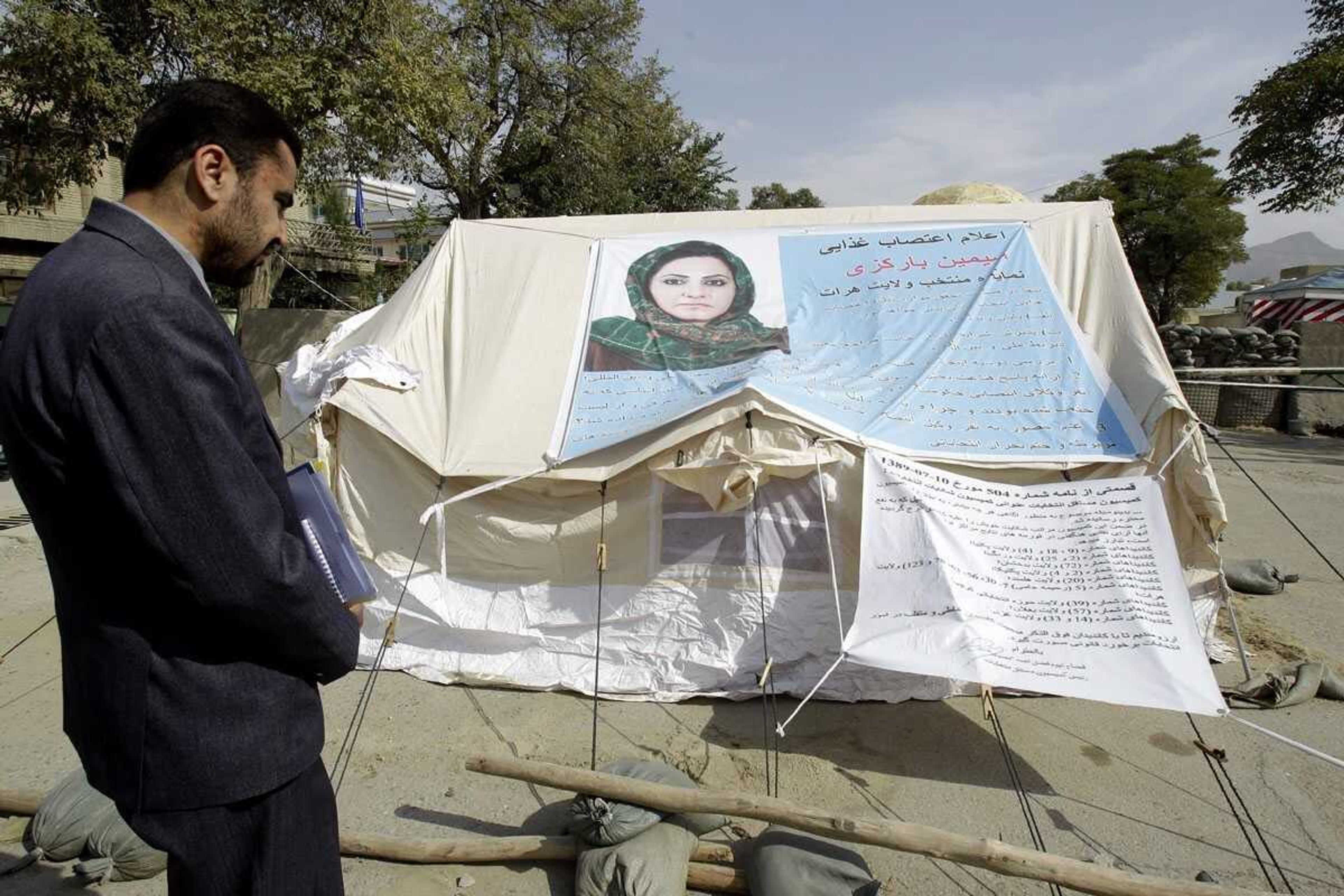Afghan lawmaker continues hunger strike
KABUL, Afghanistan -- It was the eighth day of ousted Afghan parliamentarian Simeen Barakzai's hunger strike. Through chapped lips and in a rough voice, she said Sunday she would not drink or eat anything until President Hamid Karzai opened an investigation into vote fraud by the woman who has taken over her seat...
KABUL, Afghanistan -- It was the eighth day of ousted Afghan parliamentarian Simeen Barakzai's hunger strike. Through chapped lips and in a rough voice, she said Sunday she would not drink or eat anything until President Hamid Karzai opened an investigation into vote fraud by the woman who has taken over her seat.
Her protest is the latest turn in a seemingly interminable dispute over who belongs in the Afghan parliament -- still going on, more than a year after elections that were marred by fraud.
Fraud monitors discarded 1.3 million ballots from the poll -- nearly a quarter of the total -- and disqualified 19 winning candidates before results were finalized last fall. But many of the losers had argued that voters had been disenfranchised and pressured Karzai to revisit the results. Karzai eventually took the case to the courts, which ruled that 62 sitting parliamentarians should be removed, even though the court had no legal standing to change the results.
The accusations, investigations and law-bending have delayed work and threatened to undermine the legislature's legitimacy.
Barakzai is one of nine parliamentarians removed from their seats in August as part of a pragmatic but messy compromise that was meant to finally end the saga and let the lawmakers get to work. The U.N. and a host of international missions released statements welcoming the ruling by Afghan election officials.
Even so, that decision sparked a new round of protest and political maneuvering that only finally seemed ready to die down on Saturday when a group of boycotting parliamentarians returned to session.
A look at the disputes
But now, Barakzai's hunger strike appears likely to reopen the dispute all over again. A group of about 30 lawmakers -- many of them in leadership positions in parliament -- have called for Karzai to open a formal investigation into her case. They gathered in the small tent outside parliament where Barakzai lies on a cot on Sunday afternoon and told her that they were hopeful that Karzai would meet their demands.
The speaker of the lower house of parliament, Abdul Raouf Ibrahimi, said he spoke with Karzai on the phone earlier Sunday and said the president had promised to launch an investigation. Then he urged Barakzai to let them take her to a hospital, or at least to take a glucose drip.
She refused both.
"The president is making false promises," she said, crying. She said she would not break her fast until an independent investigation had started. And by independent, she explained, she meant she didn't want the Supreme Court or election officials involved. She wanted civil society groups or independent groups that had worked as election monitors involved.
Asked why she had chosen this form of protest, Barakzai said: "I don't have any other way. I don't have any people high up in the government."
Her plea was a sign of how little trust there is in government institutions in Afghanistan these days. Despite Karzai's pledges to clean up corruption and curtail cronyism since his own fraud-filled election in 2009, there has been little evidence of progress.
Afghanistan is very much a country ruled by presidential decree, with few checks on that power. When seven of Karzai's choices for ministerial posts were rejected by parliament, he appointed them as acting ministers.
The Supreme Court has been operating outside of regular Afghan law since the June 2010 expiration of the term of Chief Justice Abdul Salam Azimi. Karzai issued an emergency decree to extend Azimi's tenure, but never put the decree to parliament, which is required to approve all Supreme Court nominations.
And parliament is hamstrung by controversy over the vote. Barakzai's complaint is that the woman who now has been given her post as a representative for western Herat province had been previously disqualified for vote fraud. Her staffers supplied a copy of letter from a U.N.-Afghan fraud-monitoring watchdog disqualifying that woman, Rahima Jami for "massive fraud."
That fraud-monitoring group, the Electoral Complaints Commission, was disbanded after election results were finalized.
Now Barakzai and other allied parliamentarians say it is the international community -- and specifically the United Nations -- that has abandoned them by backing the ouster of the nine lawmakers.
Connect with the Southeast Missourian Newsroom:
For corrections to this story or other insights for the editor, click here. To submit a letter to the editor, click here. To learn about the Southeast Missourian’s AI Policy, click here.










